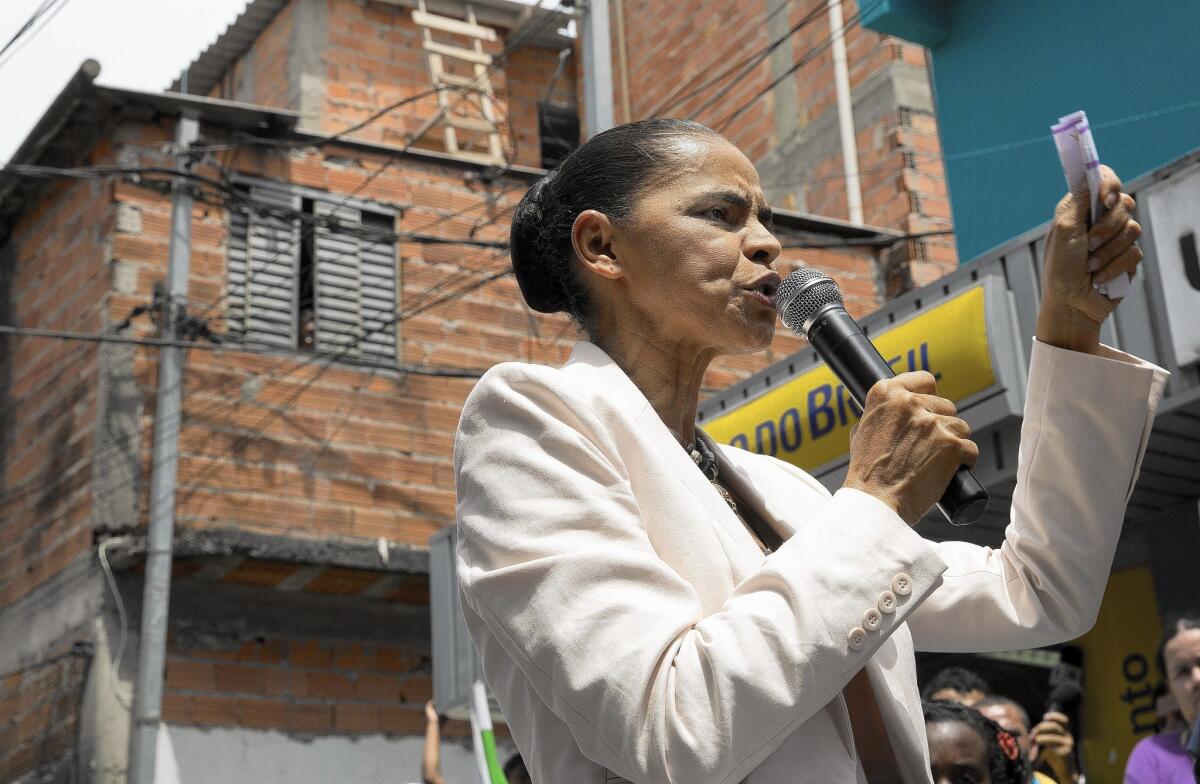Recession in once-booming Brazil shakes up presidential race

- Share via
Reporting from Belo Horizonte, Brazil — When presidential candidate Marina Silva takes to the stump, she shares compelling details of her life story: rising from abject poverty in the Amazon to become a senator with an advanced degree in psychoanalysis.
But just as often these days, Silva uses her campaign appearances to take direct aim at incumbent Dilma Rousseff, who has presided during a downturn in the long-booming economy.
“She doesn’t deserve the support of our families,” the diminutive Silva shouted into a microphone during a recent speech in the heartland state of Minas Gerais. “What happened to growth? We’re suffering from inflation, and our interest rates are sky-high.”
Less than two months ago, Silva’s Socialist Party had little chance of upending Rousseff and her Workers’ Party, which has overseen Brazil’s rise since 2003.
But the situation changed when Silva, an environmentalist and former senator, became the Socialist candidate after candidate Eduardo Campos died in a plane crash. Campos was running a distant third, but Silva, already well known and supported by some middle-class liberals, quickly pulled ahead of center-right candidate Aecio Neves.
In the last week, polls showed that after attacking Silva, Rousseff and Neves had made gains. The polls, which indicated the incumbent was the favorite to win, were followed by large losses in Brazil’s stock market and currency, as some investors pulled out.
In a race marked by questionable claims and personal attacks, Brazil’s slowing economy and public discontent over government services have become persistent problems for Rousseff.
In August, economists declared that Brazil was in recession after two quarters of contraction.
The government said the downturn was an aberration, blaming the large number of public holidays granted during the World Cup soccer tournament to take pressure off the country’s creaking infrastructure.
But analysts point out that the hope was that the World Cup would boost the economy, and say that the larger problems are fueled by a slip in private investment, market mistrust of Rousseff’s administration and a failure to resolve such long-term problems as infrastructure bottlenecks and a difficult tax system.
Rousseff supporters say that Silva has been opportunistic in attacking the president’s stewardship of the economy and lacks the political support in Congress to form a government that could improve on or match the incumbent’s record.
“After three [Workers’ Party] governments, all the economic indicators are positive, and always much better than they were in 2002,” the Rousseff campaign said in a statement. “In 2002 inflation was 12.5% and unemployment dropped as quickly as was planned,” with the jobless rate falling from 10.5% to 4.9%.
Despite the downturn, Rousseff can still remind voters that the unemployment rate is low, wages have risen, and social indicators are light-years ahead of where they were when her left-wing party took control 11 years ago with the election of her predecessor, Luiz Inacio Lula da Silva.
But the public seems less convinced than in 2010, when Rousseff won easily after being handpicked by the wildly popular Lula.
Since she took office, the economy has slowed, and her popularity dropped further after a wave of protests began in June 2013, with demonstrators demanding better schools, healthcare and transportation infrastructure. At the height of the demonstrators’ popularity, 89% of Brazilians said they supported them.
“I voted for Lula, and I’m glad I did, but I’m not voting for Dilma. It’s Marina,” said security guard Nelson Rodrigues de Azevedo, 39, after a Silva campaign event in the industrial town of Betim in Minas Gerais. “So much that we thought would improve, and that they promised, simply stopped improving.”
Emerson Marcal, an economist at the FGV business school in Sao Paulo, attributes Rousseff’s uncertain chances to the economy. “And it’s not just growth itself. Inflation has remained near the upper [government] limit of 6.5% per year.”
Brazil has a history of hyperinflation, and voters still have a strong aversion to price increases, which can hit families hard if income isn’t rising too. Although most people earn more than ever before, the new middle class, whose ranks were swelled by more than 40 million people since 2003, has often found the government struggling to improve schools, hospitals or transportation.
“With Marina, I believe what she says; I have no reason to doubt her,” said Daphny Fernandes de Resende, 25, an office assistant at a real estate firm in Minas Gerais. “Whereas with the current government, we know what to expect.”
Rousseff’s support among the poor, and her party’s effective campaign machine, could easily keep her in power for four more years. Last month, the government noted that Brazil had finally been taken off the United Nations’ “Hunger Map,” which shows countries across the world with nourishment problems.
It’s possible that Rousseff could win the election Sunday with an outright majority of votes. But it’s more likely that Rousseff and Silva will proceed to a runoff Oct. 26.
Yet even if she wins, Rousseff seems to acknowledge that Brazil’s economy requires a shake-up. The incumbent recently declared that she would replace her finance minister next year.
“Brazil’s current development model worked very well from 2003 to 2010, partially because its financial system was maturing, and partially because of so much Chinese appetite for Brazil’s commodities, such as iron ore and soya,” said Marcos Troyjo, professor of international and public affairs at Columbia University.
In 2010, the economy grew by 7.5%. Brazil was internally confident and, as a fast-growing developing nation, increasingly a destination for investors worldwide.
But “despite a slowdown in China, problems in India and the effect of sanctions in Russia,” Troyjo said, “Brazil in 2014 will have the worst performance of all four.”
Bevins is a special correspondent.
More to Read
Sign up for Essential California
The most important California stories and recommendations in your inbox every morning.
You may occasionally receive promotional content from the Los Angeles Times.










